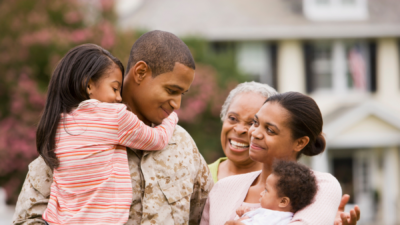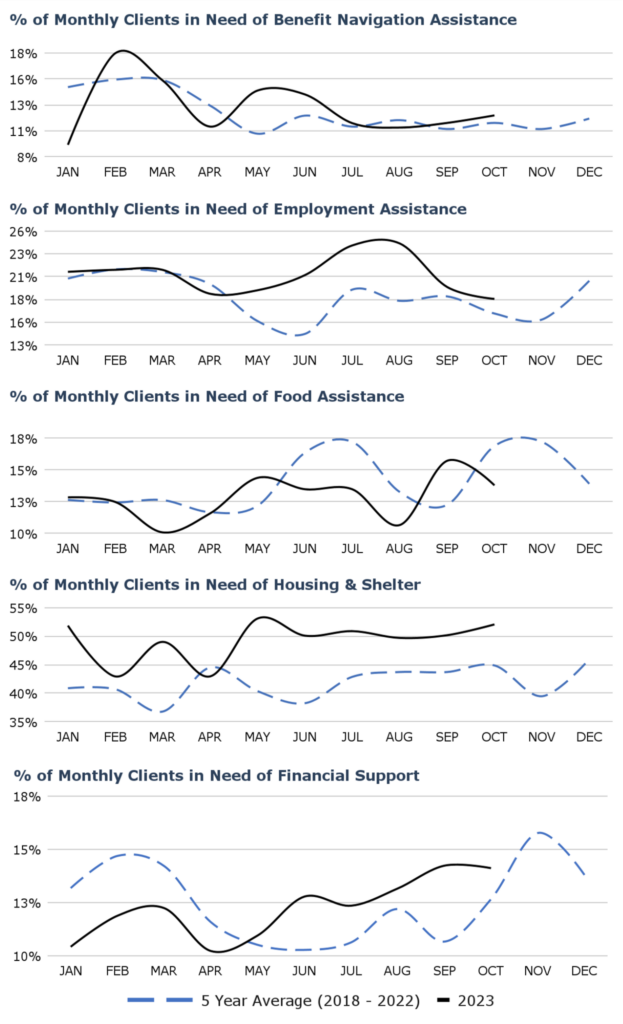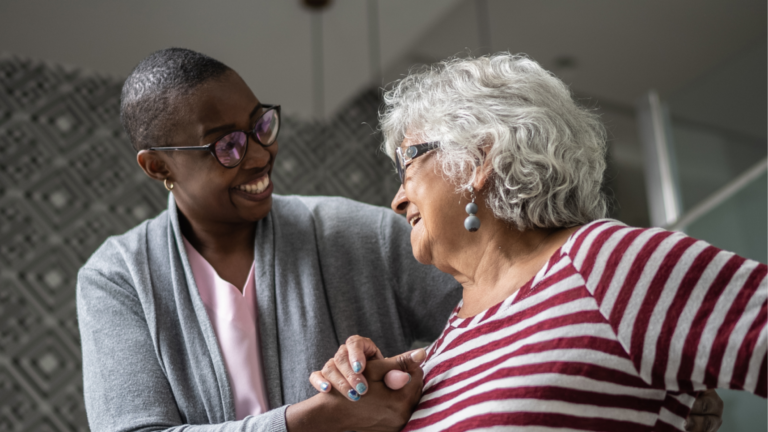
Serving Those Who’ve Served: Addressing the Social Needs of Veterans in North Carolina
Whole Person, Proactive Care for Veterans
In 2022, the United States was home to an estimated 16.2 million Veterans, all with different lived experiences during and after service, across branches, and over time. Therefore, it is essential that health concerns among Veterans and active service members are not considered monolithic. As such, the Veterans Health Administration (VHA) has adopted a whole health approach to care that supports Veterans’ health by empowering and equipping people to take charge of their health and well-being and to live their lives to the fullest.
When addressing Veterans’ health-related needs, it’s crucial to recognize that health outcomes are influenced by more than just healthcare access. Veterans frequently encounter obstacles such as food insecurity, housing instability, transportation issues, and limited job opportunities. Addressing these needs will span various organizations, providers, and clinics, leading to an increased likelihood of care fragmentation, which risks information loss, medication issues, and gaps in service. Care coordination can help ensure that Veterans receive timely and high-quality care, avoid unnecessary duplication of services, and improve their overall health outcomes. According to a study by the Department of Veterans Affairs, Veterans who received care coordination had a lower risk of 30-day ED visits and a higher probability of PCP visits at 13–30 days post-ED visit compared to those who did not receive care coordination.
“Uniting health and human service systems through effective care coordination is the next step in reducing duplicity of efforts, maximizing return on investment for health care dollars for veterans and civilians alike, as well as improving outcomes for those who have served our nation.” – Megan Andros and Reiley Burris from The Hill
Since its founding in 2013, Unite Us has launched a variety of networks to address the needs of Veterans and military families. As a Veteran-founded organization, Unite Us is uniquely positioned to assess and address social needs while assisting Veterans in gaining access to the services needed to retain health and thrive in their civilian lives.
Our approach drives the collaboration needed for those serving Veterans and their families to:
- Identify and understand community needs to inform strategy.
- Deliver services by effectively engaging the right populations and collaborating with local partners to connect them to resources.
- Pay organizations for covered services.
Serving Those in North Carolina Who’ve Served
Since 2006, North Carolina—home to the eighth-largest Veteran population in the nation (621,000) and two major military bases: Fort Liberty (Army) and Camp Lejeune (Marine Corps)—has been focused on improving Veteran access to essential, coordinated services: benefits, health and wellness, employment, legal, and financial services.
Since 2015, Unite Us has aided these efforts by building a statewide consortium of North Carolina-based Veteran service organizations through the NCServes network, now part of the NCCARE360 network which serves all community members. These organizations are vital in ensuring best-in-class service for Veterans and their families. Network partners include Veteran Services of the Carolinas, Veterans Bridge Home, the Governor’s Institute, and the NC Department of Health and Human Services (DHHS). To date, the network has served over 20,000 Veterans and active service members.
Over the last eight years in North Carolina, we have seen the unemployment rate of Veterans decrease from 3.2% in 2015 to 2.2% in 2022, and the rate of homelessness among Veterans decreased by 22% in the same time. While these yearly trends are reassuring, there is still a way to improve efficiency in care coordination: seasonal trend analysis. By utilizing real-time social care data and visualizing these needs over time, organizations can gain additional, actionable insight into the needs of the individuals they serve and improve outreach efforts.
Leveraging Real-Time Social Care Analytics
Of all North Carolinian active service members or Veterans assisted through the Unite Us Platform since 2018, the top overall needs were housing & shelter (50%), employment (26%), benefit navigation (20%), income support (18%), and food assistance (16%).
 Analyzing the needs of referred Veterans or active service members in the previous five years, we can begin to examine seasonal trends in need for those residing in North Carolina. Of the individuals sampled, the need for housing is persistent throughout the year, while the need for benefit navigation and employment assistance peaks at the start of the year. The need for financial assistance peaks during winter, and food assistance requests peak in summer and fall. (Source: Unite Us Platform data, pulled October 30, 2023)
Analyzing the needs of referred Veterans or active service members in the previous five years, we can begin to examine seasonal trends in need for those residing in North Carolina. Of the individuals sampled, the need for housing is persistent throughout the year, while the need for benefit navigation and employment assistance peaks at the start of the year. The need for financial assistance peaks during winter, and food assistance requests peak in summer and fall. (Source: Unite Us Platform data, pulled October 30, 2023)
With the most recent real-time data from 2023, we can observe how this year’s trends compare to the past. Proportionally, more Veterans and active service members require housing & shelter throughout 2023 than in the five years prior.
Using Unite Us, community-based organizations (CBOs) can observe real-time fluctuations in the needs of those they serve, improving planning and driving service allocation and targeted investment.
Proactively Identifying Social Care Needs
Actively tracking service requests may only capture some of the community’s needs. For instance, due to environmental stressors specific to military personnel, there is an increased risk of substance use disorders (SUD); however, in our sample, this need remains proportionally scarce. To grasp the genuine need, we must consider all aspects of lived conditions and working environments to proactively identify social care needs, recognizing that the key to whole health lies in understanding the broader spectrum of services.
Unite Us Social Connector helps organizations proactively identify social needs in their communities through the Unite Us Social Needs System (SNS)—the industry standard for predicting and measuring individual-level SDoH in populations across the country. It empowers organizations to utilize data to inform care management, community outreach, funding strategies, and intervention design. This solution enables veteran-focused organizations to proactively understand the needs of Veteran households, connect them to needed services, and ensure appropriate programming exists for them throughout the state.
Takeaways: Strategies for Addressing Veterans’ Health-Related Social Needs
Unite Us is proud to help serve those who have served our country in our nationwide networks. Through our dedicated efforts, we have identified key strategies to keep in mind when addressing the health-related social needs of Veterans:
- Whole Person Approach: Veterans’ experiences and needs are diverse and unique, requiring a holistic, cross-sector approach beyond healthcare access.
- Importance of Care Coordination: Care coordination is vital to ensure timely and high-quality support, preventing duplication of services, and improving overall health outcomes for Veterans.
- Real-Time Social Care Analytics: Analyzing real-time data helps identify seasonal trends in Veterans’ needs, enabling care organizations to plan and respond effectively.
- Proactive Social Care Needs Identification: Understanding the comprehensive spectrum of Veterans’ needs is vital. Challenges arise in merely observing these needs through screening, emphasizing the importance of proactive identification to ensure a comprehensive approach to Veterans’ well-being.
Better understand the needs of Veterans in your community with Unite Us.
About Unite Us
Unite Us is the nation’s leading software company bringing sectors together to improve the health and well-being of communities. We drive the collaboration to identify, deliver, and pay for services that impact whole-person health. Through Unite Us’ national network and software, community-based organizations, government agencies, and healthcare organizations are all connected to better collaborate to meet the needs of the individuals in their communities.



